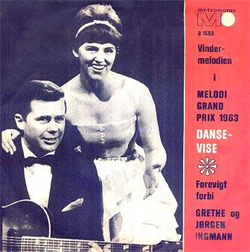
"Dansevise" is a song recorded by Danish husband and wife duo Grethe and Jørgen Ingmann with music composed by Otto Francker and Danish lyrics written by Sejr Volmer-Sørensen. It represented Denmark in the Eurovision Song Contest 1963 held in London, resulting the first entry performed by a duo to win the contest and also the first win from a Scandinavian country.
Yugoslavia participated for the last time in the Eurovision Song Contest 1992, held in Malmö, Sweden as the Federal Republic of Yugoslavia. The last Yugoslav representative was Extra Nena with the song "Ljubim te pesmama".
Yugoslavia was present at the Eurovision Song Contest 1962, held in Luxembourg, Luxembourg.
Yugoslavia participated for the first time at the Eurovision Song Contest 1961, held in Cannes, France.
Yugoslavia was present at the Eurovision Song Contest 1964, held in Copenhagen, Denmark.
Yugoslavia was present at the Eurovision Song Contest 1966, held in Luxembourg, Luxembourg.
Yugoslavia participated in the Eurovision Song Contest 1991 with the song "Brazil", written by Zoran Vračrvić and Dragana Šarić. The song was performed by Bebi Dol. The Yugoslav national broadcaster, JRT, organized a national final, JRT izbor za pjesmu Evrovizije – Sarajevo '91, to select its entry for the contest held in Rome, Italy. This was Yugoslavia's penultimate Eurovision entry in the Eurovision Song Contest.
Yugoslavia was present at the Eurovision Song Contest 1967, held in Vienna, Austria.
Belgium was represented by Lize Marke, with the song "Als het weer lente is", at the 1965 Eurovision Song Contest, which took place on 20 March in Naples. Marke was chosen internally to be the Belgian representative, and the song was chosen in the national final on 13 February. Marke had previously finished second in the Belgian preselection in 1963.
The Netherlands was represented by Conny Vandenbos, with the song "'t Is genoeg", at the 1965 Eurovision Song Contest, which took place on 20 March in Naples, Italy. Five acts participated in the Dutch preselection, which consisted of five qualifying rounds, followed by the final on 13 February. All the shows were held at the Theater Concordia in Bussum, hosted by the 1959 Eurovision winner Teddy Scholten. Vandenbos had previously taken part in the Dutch preselection of 1962. Future Dutch representative Ronnie Tober (1968) was one of the other participants.
Germany was represented by Ulla Wiesner, with the song "Paradies, wo bist du?", at the 1965 Eurovision Song Contest, which took place on 20 March in Naples, Italy. "Paradies, wo bist du?" was the winner of the German national final, held on 27 February.
Norway was represented by Kirsti Sparboe, with the song "Karusell", at the 1965 Eurovision Song Contest, which took place on 20 March in Naples, Italy. "Karusell" was chosen as the Norwegian entry at the Melodi Grand Prix on 13 February. This was the first of Sparboe's three Eurovision appearances for Norway.
Finland was represented by Laila Kinnunen, with the song "Valoa ikkunassa", at the 1961 Eurovision Song Contest, which took place on 18 March in Cannes, France. Finland was one of three countries making their Eurovision debut in 1961 and "Valoa ikkunassa" was chosen as the first Finnish entry at the national final organised by broadcaster Yle and held on 12 February.
Jugovizija was the Yugoslav national final to select their entry for the Eurovision Song Contest, organized by the Yugoslav broadcaster Yugoslav Radio Television (JRT) and its subnational public broadcasting centers based in the capitals of each of the constituent republics of the Yugoslav federation: SR Bosnia and Herzegovina, SR Croatia, SR Macedonia, SR Montenegro, SR Serbia and SR Slovenia and also the broadcasting services of the autonomous provinces within SR Serbia: SAP Kosovo and SAP Vojvodina. The first subnational public broadcasters to compete in 1961 were RTV Belgrade, RTV Ljubljana and RTV Zagreb, while the others joined in the following years.
Portugal was represented by Simone de Oliveira, with the song "Sol de inverno", at the 1965 Eurovision Song Contest, which took place on 20 March in Naples. "Sol de inverno" was chosen as the Portuguese entry at the Grande Prémio TV da Canção Portuguesa on 6 February.
Yugoslavia was present at the Eurovision Song Contest 1968, held in London, United Kingdom.
Yugoslavia was present at the Eurovision Song Contest 1963, held in London, United Kingdom.
Yugoslavia was represented at the Eurovision Song Contest 1969, held in Madrid, Spain, by an act that ended in 13th place.
Yugoslavia was present at the Eurovision Song Contest 1970, held in Amsterdam, Netherlands.
Yugoslavia was present at the Eurovision Song Contest 1971, held in Dublin, Ireland.
